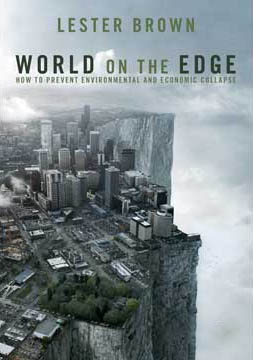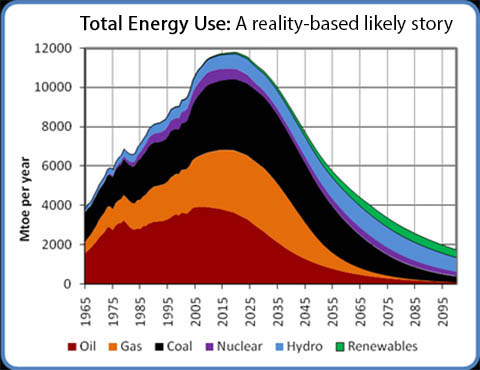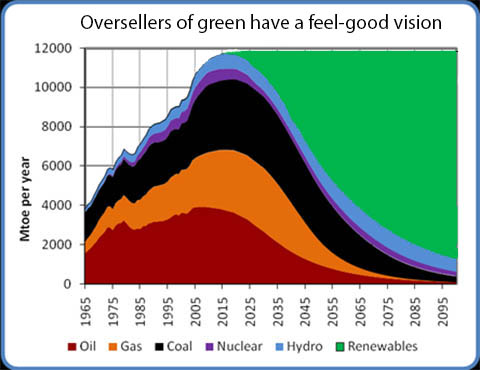
FRIDAY, April 21, 2017: NOTE TO FILE

World on the Edge, by Lester Brown, 2011
How to prevent environmental and economic collapse, a review
Eric Lee, A-SOCIATED PRESS
TOPICS: WORLD AT WHOA, FROM THE WIRES, TRANSITION TO PROSPERITY
Abstract: Lester Brown is a well-known advocate for going green and saving the world. But motivated reasoning and science don't go well together. Nor does telling people what they want to hear. Brown and company believe in political solutions that a majority of people will agree to if "properly" informed. This puts sever constraints on the thinkable.

TUCSON (A-P) — Brown, at over 50 books and counting, is as top-drawer as they come in terms of official recognition and reward, beginning with a $500,000 Rockefeller grant to start the Worldwatch Institute in 1974. His concerns and policies are based on science, but he is concerned with solutions which he and staff of idealistic university graduates sells to the public to influence the political system.
This is the service he provides. He and his staff are not specialists, but professional generalists with a mission. Nothing not to like about 'generalists' who endeavor to understand life, the universe, and everything without caring what other people think. The need to tell people what they want to hear, however, after telling them about the biophysical facts they don't want to hear or consider the implications of is a severe constraint. A scientist can 'tell it like they see it' because 'seeing it' is what science is about. Political animals, e.g. environmental activists who want to save the world or at least current human's civilization, have to add the positive spin at the end, or be ignored or otherwise marginalized. When scientists attempt to tell the public about biophysical reality issues, they typically end up marginalized, at best, because at some point they may talk stupid shit about 'limits to growth' or 'population control' and such stuff which is not what we the people want to hear. People would rather watch Hans Rosling's techno-optimist animated data presentations or read about clean coal or cleaner solar PV made by (eventually?) clean coal.
A science-type looks at the world, listens to Nature, and iterates towards a 'so that's how it really works?' narrative. Environmentalists, all public intelligentsia-types including the media, at best, and Brown is at the top of the pile, agree with those scientists they can agree with, look at the world and say, 'yes, I suppose that's how it works, but...' Their minds, and that of almost all who read their books, work differently. Those who listen to nature end up saying 'yes' when insight arises and test confirms guess, when facts become evident, they do not add a 'comma but dot dot dot'.
When science-based minds understand something, like the exponential function, the final word is 'yes period'. Normal humans can't do this. Only those who would rather know than believe can. The rest consider the implications, realize they don't like them, and alter the answer 'slightly' without realizing they are using a sleight of mind trick. They consider the biophysical reality, try to be agreeable about facts, then say 'yes comma dot dot dot', where after the comma they go on, often at book length, about how the political solutions they have come up with will not only solve the problems, redress the issues our science details, but make the world a much better place (e.g. Enough is Enough by Dietz and O'Neall, the Club of Siena, and Lester Brown). Enough people just 'have to get it' and 'get on board' and the 'solutions' will be implemented, and the world will be saved. Saving the world feels good and is an easy sell, especially to idealistic young people. Taking care of matters, just getting by, doing the best you can, hoping for the best, not thinking beyond the next paycheck or quarter's profits also feels good and will suffice (or not).
So Brown gets superlative marks for considering what our science says as filtered through the majority view of scientists (who could be wrong). This would be the first four chapters of the book. All the environmental issues are acknowledged: over population, immigration reduction, global warming, protection of world's croplands, soil erosion control, deforestation mitigation, water resources depletion, melting glaciers, decreasing groundwaters, energy depletion, energy waste and unsustainability, renewable energy, garbage reduction and recycling. And he has a plan: chapters five through twelve on up to saving civilization in chapter thirteen. His solutions, which he believes deeply in, depend upon the problems being real. All political problem solvers do the same, though some depend on the problems not being real. Most political animals don't care about biophysical reality, know less about it, and their success depends on the public who could care even less until they are educated about the facts that matter. People like Brown devote their lives to informing the public. But so does Rush Limbaugh, et al. ad nauseam. For those who know more than the average dittohead, Brown is our Knight-errant extraordinaire.
So if enough of us finally 'get it', organize, form a new party if need be, work to increase our numbers, elect those who listen, then we'll turn things around.... Well it may take an event, kind of like Pearl Harbor (attack thereon), for public opinion to flip from pro-growth to pro-enough with equity and justice for all (and dignity, freedom...). Brown is an early sustainability theorist. The Wikipedia article on 'sustainable development' cites only this book from among his many. He is credited with being, in the mid-1970s, a pioneer of the concept of sustainable development. With 26 honorary degrees and a MacArthur (genius) Fellowship not to mention various global awards for off-the-scale achievement or being on the '50 Top Americans' list, Brown has been described as 'one of the world's most influential thinkers'. One could get the impression that whatever he does serves the system and that a lot of people who read books like what he says. This is achievable only if you tell people, in the end, what they like when they hear it, which may have nothing to do with what might actually work.
The plan is to implement Plan B so 'we can change course and move onto a path of sustainable progress'. Everyone in favor of 'progress' raise your hand and gaze into futurity in wondrous anticipation. Anyone not in favor of 'sustainable' can go to the back of the class and cower. Global warming is one of many inconvenient truths. But we can reduce fossil fuel use 80% by 2020 and plant lots of trees; doing so will employ millions. Pearl Harbor got bombed and in three and a half years we won the war. In a matter of months millions of Victory gardens can be planted. There are always details; we'll also have to do a few more things by way of 'stabilizing climate, stabilizing population, eradicating poverty, and restoring the economy's natural support systems', and feed the world's people along the way to full equality. And it could all be done, no biophysical reason it couldn't be, but Brown doesn't envision some sort of Pearl Harbor event as the solution. He includes it among the possible solutions, but puts the one game changer that could actually work at the bottom of the list.
Another possible 'path of sustainable progress' down which rapid enough change can occur involves the Berlin Wall model for social/political change. Things get more and more problematic, tensions rise, nobody likes the situation, 'a tipping point is reached on a particular issue often after an extended period of gradual change in thinking and attitudes' that changes everything. The Berlin Wall served the SYSTEM when built, but in time had ceased to serve the SYSTEM on either side. It needed to come down and that it did is a rare example of a 'bloodless revolution'. Some functionaries alway support the status quo, but when the special interests of most are no longer served, change can happen without a lot of blood loss. For this model to work, at some point those living in industrial society will have had enough, someone will tell them (disingenuously) that if only they reject growth, the growth narrative, and revolt, then things will get better. At some point enough people will be shaking their fists and if degrowing the economy is also viewed by many in power as necessary, then a Berlin Wall style of change in the system could occur. Otherwise it will be revolution as usual and the 'winner' will inherit the rubble, i.e. no real solutions will be implimented.
The third option for rapid change is the one Brown favors: Think Civil Rights Movement. A powerful grassroots campaign raises up and with minimal ripping and tearing, change comes and things change for the better. And what's not to like about the Civil Rights Movement? Sometimes change occurs because it serves the SYSTEM at the time change occurs. Slavery had served the SYSTEM when the cotton picking Southern economy depended on slavery and racism was obligatory. But things change with new technology and methods. Since the Civil War and reconstruction, racism had no longer served the SYSTEM though pockets of resistance remained. Wage slavery was far more efficient and involved almost no risk for revolt. Those who protested in the 1960s or sacrificed their lives to end racism were doing what the majority in power wanted. They were serving the overarching SYSTEM endeavoring to grow prosperously, and without racism the economy will (and did) grow faster. Then there were environmental issues that needed to be solved. A movement helps solve them as best they could be without slowing economic growth and prosperity. Then there were sustainability concerns and... a new endeavor arises so sustainable 'prosperity' can continue via 'qualitative' growth (development).
For this model of grassroots activism and 'political revolution' to work, the majority in power would have to want to degrow the economy.... Think Sustainable Rights Movement. But wait, no, we can have 'sustainable progress' for all, we just have to transition from a fossil-fueled growth economy to an alternative-fuels economy. In a world where population is declining, thanks to universal 'reproductive health care and family planning services' and every woman's well educated right to choose, which goes along with the eradication of poverty, the population naturally declines secondary to the 'demographic transition'. With fewer people (naturally), per capita consumption can increase without the aggregate consumption of earth's resources increasing as they come to be evermore efficiently consumed.
The political activism model for societal change that Brown favors is the best hope, as many see it, for the needed change in course that will prevent our collectively hitting the wall. This hope, however, unlike the environmental issues Brown's Plan B is intended to solve, has nothing to do with science. That a solution feels good, that you want it to work, may have nothing to do with biophysical reality. Brown's Plan B solution depends on there being problems such as anthropogenic climate change. Thus he only mentions global warming as a bad thing. He cannot confuse the politicized issue by considering the benefits of global warming, which in a science-based universe of discourse is thinkable (CO2 is a plant fertilizer). In the political-speak universe, if you don't like the implications of alleged climate change, then it is a natural fluctuation, it has nothing to do with human activities because believing otherwise wouldn't feel good. If you're on the other side of the political spectrum, then you likely do believe in global warming as a real problem if the policies you favor are the solution. That anthropogenic global warming is likely to become an increasingly obvious fact means believers in global warming will benefit and can expect the political tide to turn their way, and what's not to like about that?
The unexamined life we collectively live is based on the assumption that politics solves problems. The social system (especially social media) fosters the belief that political activism solves problems. To solve real problems, however, implies actually understanding them in such a way that real solutions can be forthcoming that may, likely will, have nothing to do with what people want. To limit 'solutions' to what people are willing to consider, to like, to choose, to be for..., is too restrictive. A needed change may not feel good at the time. A majority of five-year-olds on a playground may not understand the biophysical issues suggesting they do something unpleasant like stop playing and dig holes with their bare hands as fast as they can for no reason they could understand in time. They may well not listen and vote with their feet to do what they want.
The analogy may be apt. For no reason that need be imagined, imagine one teacher realizes that all the children face an existential threat in the near future. All could survive if they stopping playing and dug down to lay in the hole. Without time to explain the situation to other staff, the teacher attempts to tell the children what needs to be done. Some might listen; none might listen. Some might get scared but fail to dig and merely spread hysteria. All could survive. None may survive or most might survive. Doing a simulated event on a hundred playgrounds would allow a reasonable prediction and identify what technique is most likely to work. But no time for that.
If you want to pin all your hopes on political solutions (not those of others but yours), then why should you be different? There have been upwards of a hundred empires big enough to merit a name in just the last seven thousand years. We live in one, the only one left as all prior ones rose and fell. We rose to become the first global empire and we haven't fallen yet. The belief that we won't is a near universal and even those who believe in a 'shit-hits-the-fan' narrative think, on the basis of no evidence, that they will be one of the survivors to inherit the world— a wonderfully feel-good narrative. All prior empires at the height of their trajectory likely felt the same. Most, like Brown, who understand enough to know that energy is what makes our economy go around, not money, realize that alternative energy is our only (misguided) hope to avoid descent and then only if it can replace fossil fuels to provide as much or more energy/wealth. This enables them to call for an end to fossil fuel use in the near future to mitigate climate change and grow the sustainable economy, qualitatively of course.
Brown and ilk believe in the political system and political solutions because at this point in history politics is the only game in town (though in parts of the world religion is too). If you don't play the coming endgame and prevail, then perceived problems cannot be 'solved' and if the problems are an existential threat to the human species, then believing in political solutions seems obligatory. Nothing wrong with the intent, but at some point one might consider asking 'so how's that political solutions thing working for us anyway'? If politics is the only game in town, maybe we need to invent another one. It may not be implemented in time this time around, but if the information about what works is preserved, it could help avoid another round of empire-building.
Brown's book is free online. My local library has two copies. None of the 27 libraries in the Tucson area has a copy of Demystifying Sustainability: Towards real solutions and only the University of Arizona has an ebook version students and staff could read if they would. That Brown is a player, is in no way a threat, has always served the SYSTEM, whose Plan B hasn't a chance of interfering with business as usual (not unlike the Schools of Sustainability that are proliferating), may have something to do with his success (and exponetial growth in the number of Schools of Sustainability) and something to do with thoughts of real solutions being marginalized. None of the marginalizing is decided by malevolent figures in a smoke filled room. It is how systems as unmanaged commons self-organize during growth. Normal humans in the industrial growth society want the party to go on. It's a social primate thing.
Those who do listen to scientists who listen to Nature need to be distracted from their concerns. This is true for most scientists too who also use sleight of mind tricks to avoid seeing the implications of unpleasant facts. Most scientists also serve the SYSTEM and depend on it. Almost all humans are specialists who see things much the same when not looking through their microscope. Telling the decision makers what they don't want to hear is allowed. Some may even solicit disconcerting information hoping it will help. It's okay. In the end they do what they have to, they do the best they can, and meanwhile the pace of planetary destruction continues. How things really work, the science of it, may have something to with with 'emergy'. Maybe emergy yield ratios matter, or maybe environmental accounting is more important than the bottom line, but it's okay, decision makers can use 'emergy analysis' to help make decisions as long as emergy isn't actually central to making decisions. Humans matter, so human needs and rights matter. Equity, freedom, dignity, justice, rights..., trump biophysical reality and enable 'sustainable prosperity' and 'qualitative development' to continue. Meanwhile the pace of ....
 |

People would rather feel-good believe than know. |
